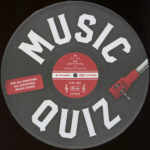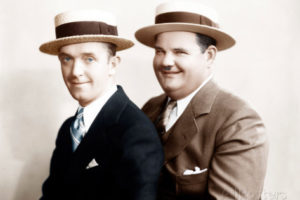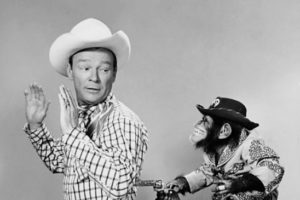There are concert movies, biopics about musicians and documentaries about performers, bands and events. There are also movies in which music is not front and center–but have great music in them. Indeed, there are tons of them. A song can make or break a movie. There are two issues to making it all work: The music itself and effectively integrating it into the film.

This list is in no particular order. Please use the comments to offer suggestions.
“Deliverance”: The scene in which the urbanite (Ronnie Cox) and the kid from the Georgia backwoods (Billy Redden) work through “Dueling Banjos” is iconic. The two characters seem to be creating a shared language. It feels like a scene from a sci-fi film in which extraterrestrials drop by. Director John Boorman may simply be saying that people from the cities and the sticks are from different planets, which certainly is true. Also note also how long he took to build the scene. My modern sensibilities want it to happen faster. There are all sorts of interesting sidelights to the scene, which include a hidden banjo player and a lawsuit. The instrumentalists are Eric Weissberg (banjo) and Steve Mandell (guitar). The movie was released in 1972.

“Anatomy of a Murder”: I’m stretching the definitions here because this really is an entire soundtrack. But this scene — in which Jimmy Stewart sits at the piano with Duke Ellington — is not as iconic as it should be. The roadhouse atmospherics are great.
The movie, which was released in 1959, was directed by Otto Preminger. It is famously forthright and honest in its treatment of sex crimes and in the realism of the trial. I believe it has been used in law schools. The judge is Joseph Nye Welch, who took on Joe McCarthy during a 1954 Congressional hearing on communist influences in the armed services. Ellington for some reason is not credited. The director was Otto Preminger.

“The Life Aquatic with Steve Zissis”: This odd 2004 Bill Murray film features Seu Jorge, a Brazilian singer. He plays a great, simple version of David Bowie’s “Changes” in Portuguese. It’s interesting that upbeat rock songs always sound good when they are slowed down and simplified. Eric Clapton’s acoustic version of “Layla” is another example.

“The Bridge Over the River Kwai”: The 1957 hit features “The Colonel Boogie March.” The backstory is interesting. David Lean is considered one of the great directors in movie history. His credits include “Lawrence of Arabia,” “Doctor Zhivago,” “Great Expectations,” “Oliver Twist” and “In Which We Serve” (with Noël Coward). It stands to reason, then, that idea of having the prisoners whistle would be a bit of genius from the director.
Not so. Wikipedia says that the extras playing POWs couldn’t march in time, annoying Lean. A fellow on the project happened to be a great whistler and thought that “The Colonel Boogie March” would help. It did, and Lean got the credit.

“Pulp Fiction”: John Travolta and Uma Thurman dancing to Chuck Berry’s “You Never Can Tell” alongside intentionally cheesy Marilyn Monroe and Ed Sullivan imitators is one of many surreal and deeply comedic (as opposed to funny) moments in the film, which was released in 1994. Most of the credit for the scene–and everything else in the one-of-a-kind film–go to director Quentin Tarantino.

“The Fifth Element”: This is one of the most entertaining films I’ve ever seen, from beginning to end. Bruce Willis is like James Taylor and Willie Nelson. All three make things that are very hard look easy. Other people try to do what they do–and most fail. A note at iMDB says that the extraterrestrial diva in this scene—Diva Plavalauna—sings “Il dolce suono,” which was written by Gaetano Donizetti. It is, according to the note, “an aria from the opera Lucia de Lammermoor. It is one of the most difficult arias because of its length, its soaring arpeggios, and the high F above high C.” That bit of classiness doesn’t stop the beautiful Milla Jovovich from giving The Three Stooges a shout out towards the end of the clip. The iMDB trivia notes are interesting.

“Pat Garrett and Billy the Kid”: Bob Dylan plays a character named “Alias” in the 1973 film. Acting is not Dylan’s thing, to say it kindly. His real contribution is the epic, dirge-like “Knockin’ on Heaven’s Door.” The scene – in which a dying Slim Pickens looks forlornly and apologetically at his significant other (I’m not sure who she is) is sad and poignant. It’s a perfect match of music and content. The movie also features James Coburn, which is another thing in its favor.
 “Wayne’s World”: For a while back there Mike Myers was a genius and Garth, Wayne and friends trying not to hurl while driving to “Bohemian Rhapsody” is on the list of reasons why. It’s use of an iconic song that itself became iconic. The movie was released in 1992. Party on, forever.
“Wayne’s World”: For a while back there Mike Myers was a genius and Garth, Wayne and friends trying not to hurl while driving to “Bohemian Rhapsody” is on the list of reasons why. It’s use of an iconic song that itself became iconic. The movie was released in 1992. Party on, forever.
 “Dog Day Afternoon”: The Daily Music Break has already touched on the opening sequence, a montage in which director Sidney Lumet checks out what else is happening in New York City on August 22, 1972. This is a counterpoint to the claustrophobic action that is about to get underway at a bank in Brooklyn.
“Dog Day Afternoon”: The Daily Music Break has already touched on the opening sequence, a montage in which director Sidney Lumet checks out what else is happening in New York City on August 22, 1972. This is a counterpoint to the claustrophobic action that is about to get underway at a bank in Brooklyn.
Lumet is right up there with Woody Allen and Martin Scorsese as great directors of movies about New York City. I think he understood that New Yorkers love the city and think it sucks for the same reason: A million parallel universes are lumped haphazardly atop each other and each is blissfully ignorant of the others. The montage is set to Elton John and Bernie Taupin’s great song “Amoreena.”

“Performance”: The song “Memo from Turner” was recorded three times. Two were by the Rolling Stones and one by Traffic’s Steve Winwood and Steve Capaldi. It’s likely the 1970 movie was just as skeevy and grim as the song.
 “Shaft!”: This list also wouldn’t be complete without Isaac Hayes’ “Theme from Shaft,” the opening sequence from the 1971 movie starring Richard Roundtree.
“Shaft!”: This list also wouldn’t be complete without Isaac Hayes’ “Theme from Shaft,” the opening sequence from the 1971 movie starring Richard Roundtree.

“Pee Wee’s Big Adventure”: While certainly not a good look for a kids’ entertainer, the virtual end of Paul Reubens’ career due to an arrest at a porno theater in 1991 was a sad thing. Reubens’ Pee Wee Herman man-child character had the rare ability to entertain kids while winking at the grownups…and entertaining the grownups while winking at the kids.
In this scene, Herman yells at a bunch of bikers to shut up because he was trying to make a phone call and dancing on the bar to “Tequila” in the 1985 film. It isn’t “Citizen Kane,” but in its own way a great moment in cinema history.
 “Casablanca”: Of course, the 1942 film is famous for Rick and Ilsa and Sam (Humphrey Bogart, Ingrid Bergman and Arthur “Dooley” Wilson) and “As Time Goes By.” But the most stirring moment of the film is the Frenchies singing “La Marseillaise” in a symbolic beat down of the Nazis at Rick’s Place. I suppose the soap opera elements of the movie get a pass since it was released during the war. People needed heroes.
“Casablanca”: Of course, the 1942 film is famous for Rick and Ilsa and Sam (Humphrey Bogart, Ingrid Bergman and Arthur “Dooley” Wilson) and “As Time Goes By.” But the most stirring moment of the film is the Frenchies singing “La Marseillaise” in a symbolic beat down of the Nazis at Rick’s Place. I suppose the soap opera elements of the movie get a pass since it was released during the war. People needed heroes.

“Reservoir Dogs”: The fact that it’s so difficult to watch Mr. Blonde — Michael Madsen — torture a cop is proof that it’s good filmmaking. One critic wrote that the scene’s tension is due to viewers’ developing identification with Mr. Blonde due to his goofy dancing. Perhaps. Or maybe it’s simply is difficult to watch a bound man being sliced with a knife.
The song is Stealers Wheel’s “Stuck in the Middle with You.” “Breaking Bad” used the same trick of superimposing a light song on a dark scene. In that case, it was Walter White freaking out and getting pepper sprayed and arrested in a scene which began with America’s “A Horse with No Name,” the poster child for innocuous songs.

“Midnight Cowboy”: Like “Dog Day Afternoon,” an opening credits masterpiece. “Everybody’s Talkin’ ” was written by Fred Neil and sung by Harry Nilsson, a Beatles favorite. It’s a cliché, but true: It doesn’t get any better than this. The movie was released in 1969 and was the only X-rated film to win the Best Picture Oscar.

“Do the Right Thing”: Spike Lee has said that the title of his 1989 film was chosen because the expression is common in both the African-American and Italian communities. I’m no expert, but it seems safe to say that “Fight the Power” by Public Enemy is deeply ingrained in hip hop’s DNA.
 Bonus Track: A headline about the top 16 of anything looks a bit odd. Why 16? So I went with 15 and a bonus.
Bonus Track: A headline about the top 16 of anything looks a bit odd. Why 16? So I went with 15 and a bonus.
What are the odds that songs featuring Slim Pickens would be the only actor to make two appearances on a music list? Of course, the second is his ride to immortality aboard an atomic bomb in director Stanley Kubrick’s classic (and oddly punctuated) 1964 film “Dr. Strangelove, Or: How I Learned to Stop Worrying and Love the Bomb.”
It’s brilliant, but I’ve always been a bit bothered by the sardonic use of “We’ll Meet Again.” The song was popularized by Dame Vera Lynn as the world struggled against the darkness of World War II. TDMB has written about this almost sacred song. Like it or not, it was a perfect choice. Originally, it was about the triumph of good. In Kubrick’s use, the other side wins.
The TDMB covers media and music on a regular basis. Check out our list of media-related music sites in the Internet Music Mapping Project. A list of top rock movies is here and music closely related to television is here.



























Recent Comments